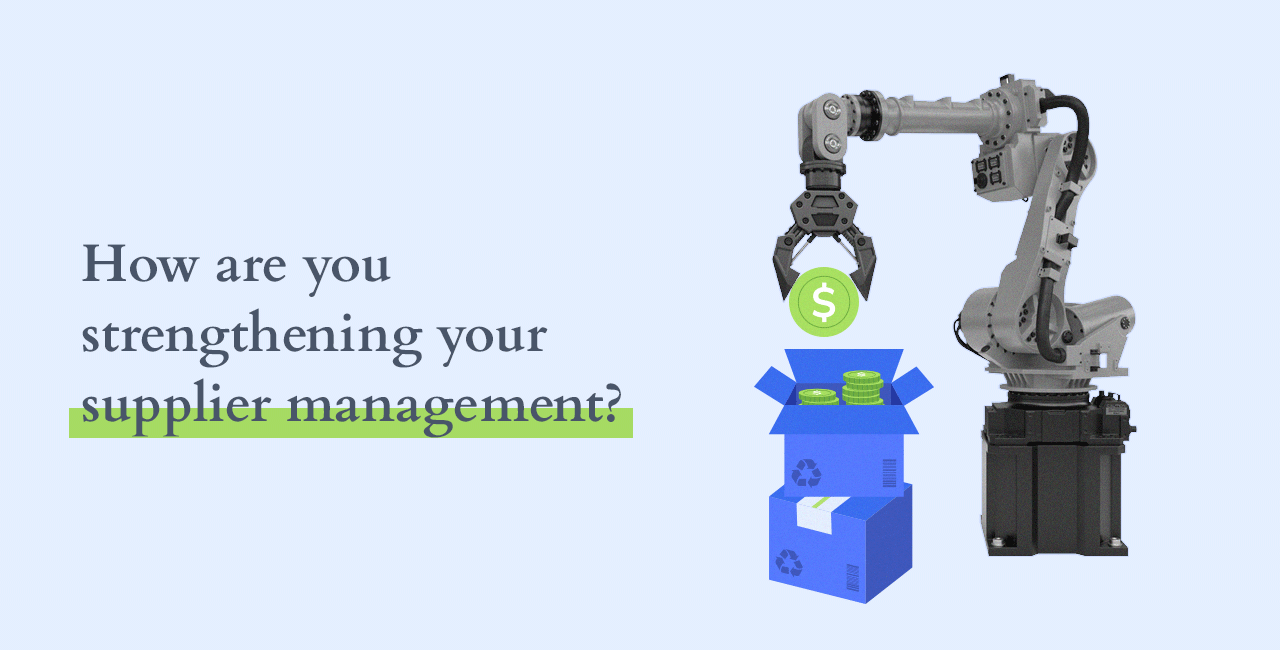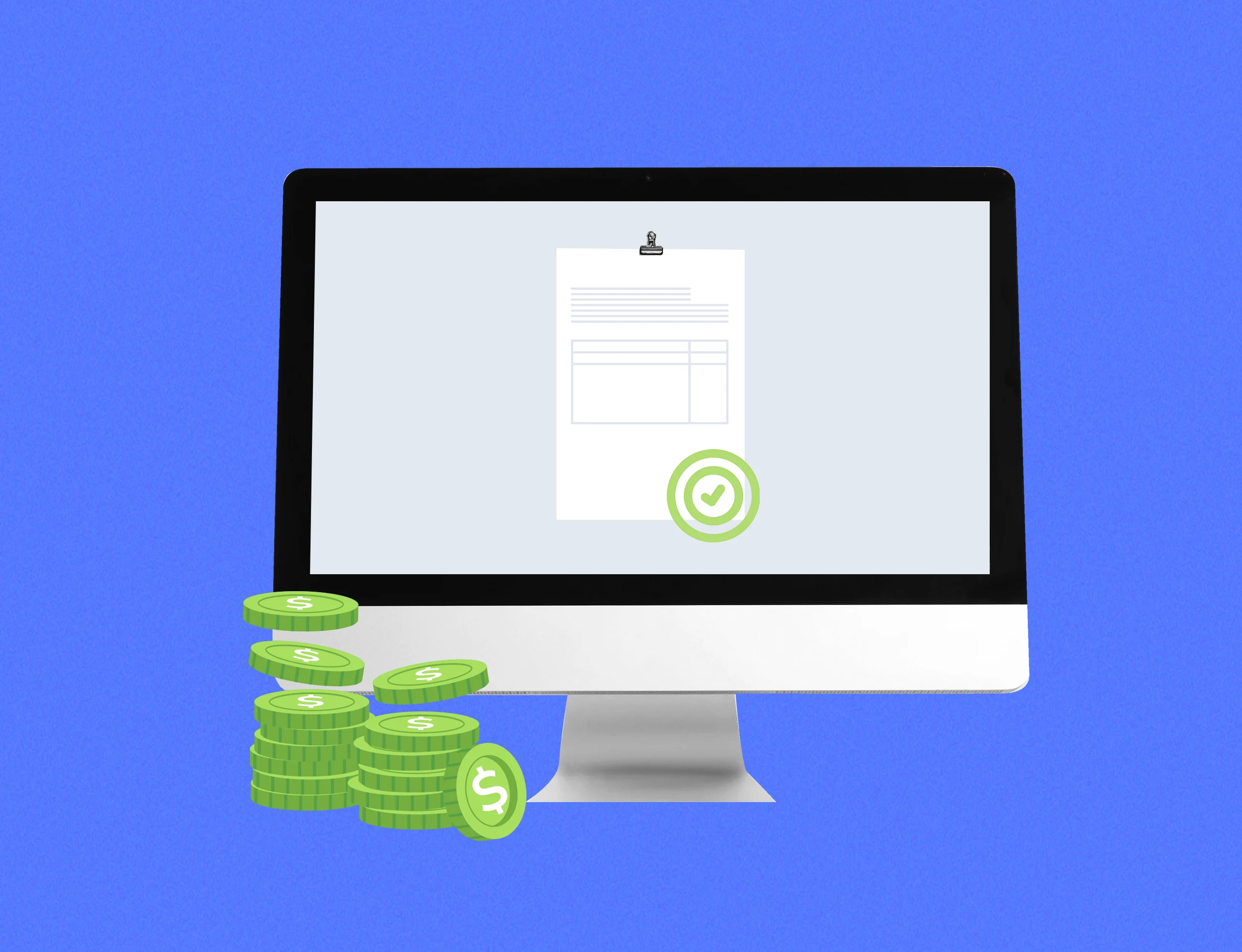Managing supplier relationships is at the heart of any successful business. Leveraging your suppliers’ strengths while reducing potential risks can give your company a significant competitive edge.
In this comprehensive guide, we delve into the realm of supplier management best practices, unraveling the strategies and procedures that can elevate your business operations to new heights.
Understanding Supplier Management: More Than Just a Procurement Process
Effective supplier management allows businesses to understand where their money is being spent and ensures that suppliers deliver the promised quality of goods and services.
In today’s digitally connected world, even small and medium businesses are exposed to international supply chains, which increases the complexity of managing multiple suppliers.
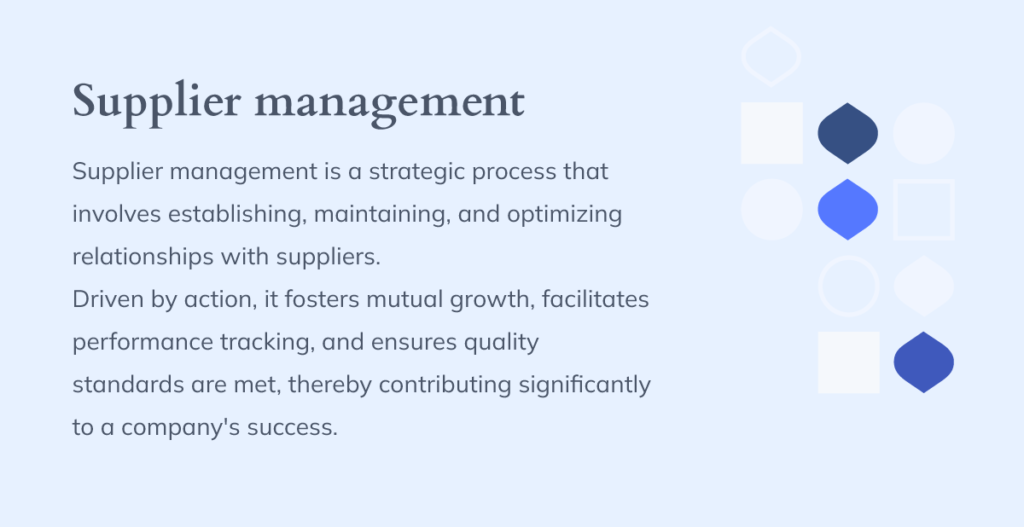
What is Supplier Management?
Supplier management refers to the strategic process of knowing, selecting, and managing relationships with suppliers that provide essential goods and services to your business.
→ It involves tracking vendor performance, checking if they meet your business requirements, and extracting maximum value from these relationships.
What is Supplier Lifecycle Management (SLM)?
The supplier management lifecycle is a comprehensive approach that oversees and manages the various interactions between a business and its suppliers.
• It’s a strategic alignment to monitor all suppliers for optimal performance, adherence, minimal risk exposure, and transparency during their contract period.
→ SLM comprises eight stages: supplier identification, supplier evaluation, supplier engagement, contract negotiation, supplier onboarding, supplier performance management, supplier risk management, and finally, supplier relationship management. Each stage is pivotal in ensuring a productive and beneficial supplier-business relationship.
What is Supplier Relationship Management (SRM)?
SRM is a systematic, enterprise-wide approach to optimize supplier interactions and collaboration.
• The goal is to drive strategic value, reduce risk, and cultivate innovation.
→ SRM transforms supplier interactions from merely transactional to becoming more strategic, fostering collaboration, continuous improvement, mutual growth, and success.
Why is Supplier Management Important?
Supplier management is about more than just procuring goods or services. It’s about building and maintaining strong business relationships and contributing to a robust supply chain. Moreover, a solid supplier management process is essential in keeping a business’s competitive edge.
• It helps improve predictability and visibility into your supply chain, enabling informed business decisions and the capability to circumvent disruption.
→ A well-executed supplier management program and strategy can significantly impact a company’s bottom line, streamline operations, and foster long-term, mutually beneficial relationships with suppliers.
The Benefits of Supplier Management
Effectively managing suppliers can bring about several notable benefits:
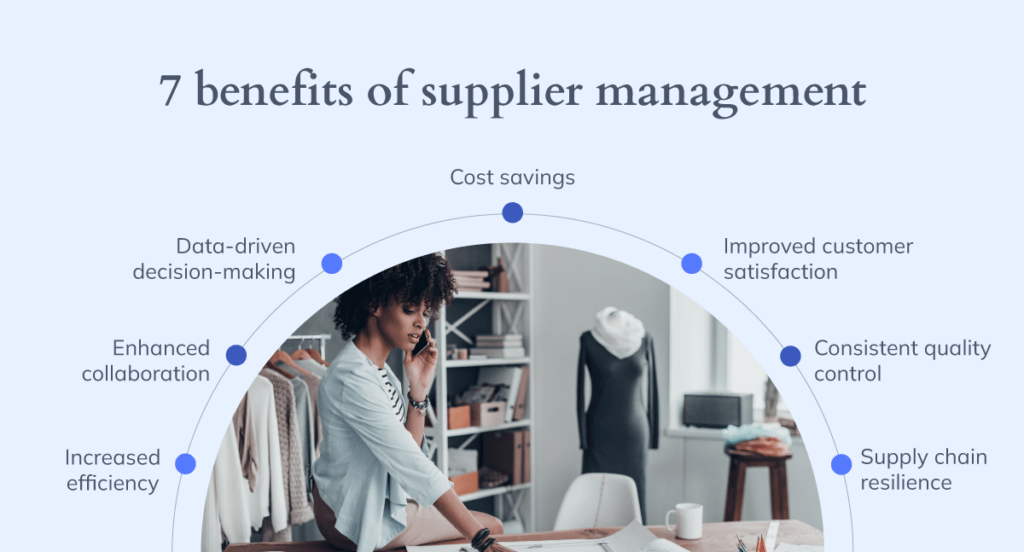
Enhanced Collaboration
A well-managed supplier relationship fosters mutual understanding, leading to better collaboration.
Supply Chain Resilience
Effective supplier management helps identify potential risks and implement measures to reduce them. This, along with a strong supplier relationship, minimizes supply chain disruption risks.
Increased Efficiency
Streamlining supplier processes can lead to improved efficiency in your operations.
Consistent Quality Control
Regular supplier evaluations ensure that the quality of products remains consistent.
Cost Savings
By identifying inefficiencies, you can negotiate better terms and conditions based on supplier performance, thereby realizing significant cost savings. Additionally, you can implement supply chain finance solutions like early payment discounts or dynamic discounting to streamline working capital.
Improved Customer Satisfaction
Timely delivery and quality products and services result in happy customers, which is any business’s ultimate goal.
Data-Driven Decision-Making (DDDM)
Supplier management streamlines data from multiple sources, offering insights for improved decision-making, minimizing supply chain disruptions, and effectively meeting customer demands.
Strategizing Supplier Management: Best Practices for Success
Successful supplier management relies on a combination of supplier management best practices. These practices include:
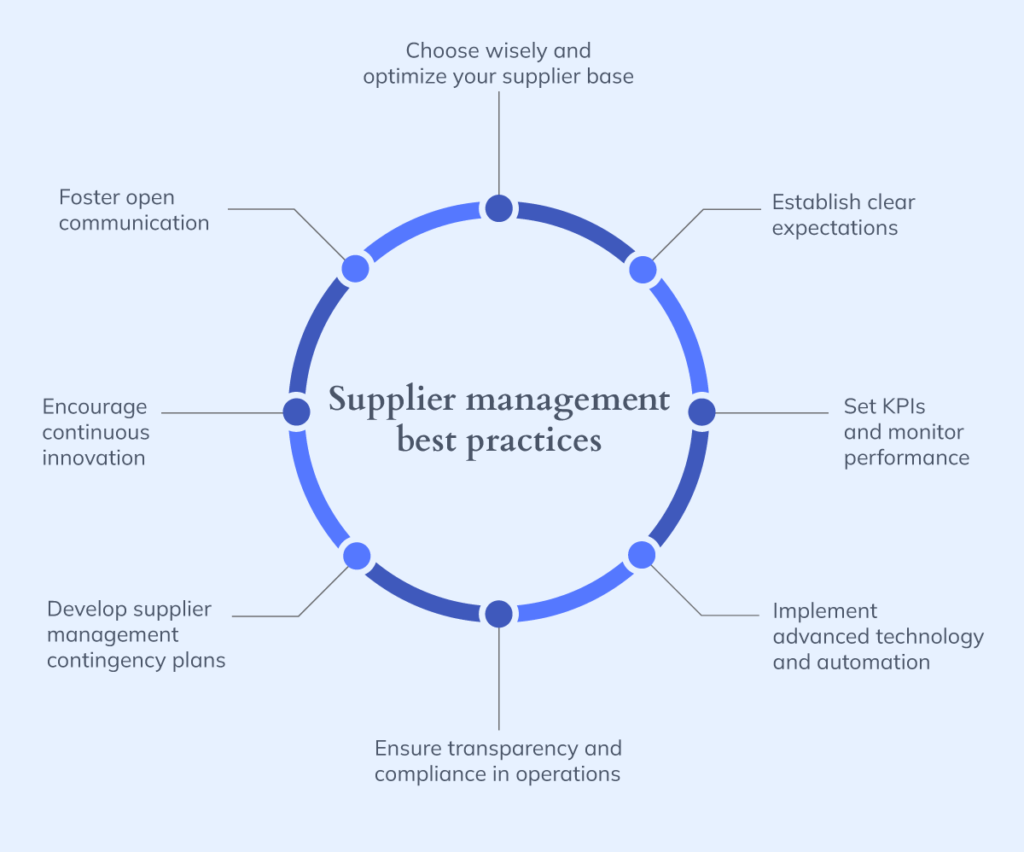
1. Establish Clear Expectations
Establishing clear expectations is the foundation of successful supplier management. Defining your needs, requirements, and desired outcomes upfront is important so suppliers understand their obligations and can meet your standards. The clarity of expectations promotes mutual understanding and reduces potential conflicts.
2. Choose Wisely and Optimize Your Supplier Base
Be selective about who you work with and ensure their business’s values align with yours. Moreover, optimize your supplier base by analyzing and segmenting suppliers based on their importance to your business processes. For example, you can organize them by size, industry, timeliness of payments, or speed. This strategic approach allows you to prioritize resources and efforts, resulting in a more efficient supplier management process that minimizes waste and maximizes value.
3. Set KPIs and Monitor Performance
Establish key performance indicators (KPIs) that align with your business goals and procurement objectives. Subsequently, conduct regular evaluations of supplier performance to gain insights, identify potential risks, and pinpoint improvement areas. This strategy facilitates proactive management and the timely implementation of correct actions, which benefits both parties. Moreover, it ensures a healthy supply chain and consistently delivers customer value.
4. Foster Open Communication
A strong partnership fosters mutual trust and builds long-term supplier relationships. Regular interactions, feedback, and information sharing can promote transparency, mutual understanding, and collaborative problem-solving, leading to improved performance, stronger relationships, and consistent delivery of quality products. This strategy strengthens the supply chain and enhances overall business performance.
5. Implement Advanced Technology and Automation
Utilizing a supplier management system can streamline the supplier management process. It offers real-time data and analytics, facilitating more informed decision-making and effective risk management. This technology-driven approach can significantly enhance efficiency and transparency.
→ With Bancoli, you can automate invoices, payment reminders, and early access to ensure timely payments. You can focus more on your strategy and vendor relationships by automating these tasks.
6. Encourage Continuous Innovation
Tapping into supplier expertise can provide invaluable insights into market trends, customer needs, and emerging technologies. It can lead to improved products, processes, services, and business strategies, providing a competitive advantage in the marketplace.
This proactive approach fosters a culture of creativity and adaptability, helping your business stay ahead and maintain a competitive edge.
7. Ensure Transparency and Compliance in Operations
Regular audits and reviews ensure suppliers adhere to necessary regulations and standards, promoting transparency, trust, and ethical business practices.
8. Develop Supplier Management Contingency Plans
A contingency plan ensures that your supply chain can withstand disruptions and operate effectively. It involves identifying potential risks, developing response strategies, and regularly reviewing and updating the plans based on evolving business needs and market conditions.
Expanding your supply chain network is an excellent strategy for having options when things don’t go as planned. It’s the first step to developing high-performance supply chain financing.

How Bancoli Can Help
Bancoli is an all-in-one B2B platform delivering banking, payments, and invoicing solutions designed to streamline and strengthen the supply chain. Here’s how Bancoli can help:
Global Reach with Multi-currency Accounts
With Bancoli’s Global Business Account (GBA), businesses can hold, receive, and disburse money in different currencies with a multi-currency account, all in one place—without needing multiple accounts or bank transfers.
Moreover, with a GBA, you can transact in over 25 currencies and 200 countries globally, saving on conversion and foreign transaction fees. Finally, a remarkable advantage of Bancoli is that transfers between Bancoli accounts are instantaneous, facilitating international transactions.
Minimize Human Error and Supply Chain Disruptions
Bancoli’s e-invoicing solution provides a reliable single source of truth for all your supplier transactions. It allows businesses to automate and schedule invoices directly to their client’s bank accounts, reducing manual errors or discrepancies.
This ensures reliable, on-time, and even early payments save time and minimizes the chances of ending up in spam folders.
AI Suggestions for Discounting Strategies
Optimize your cash flow by using AI-driven discounting strategies. Bancoli AI provides tailored suggestions for offering early payment discounts to ensure prompt payments and maximize revenue.
Strengthen Supplier Relationships with KYV Verifications
Bancoli’s Know Your Vendor (KYV) verifications help businesses increase transparency and build and maintain strong supplier relationships.

Takeaways: Opportunities Abound
In conclusion, effective supplier management can open up a world of opportunities for your business. It can enhance operational efficiency, reduce costs, and improve customer satisfaction.
By implementing the best practices mentioned above and using innovative solutions like Bancoli, you can leverage automation and master supplier management to take your business to new heights.

